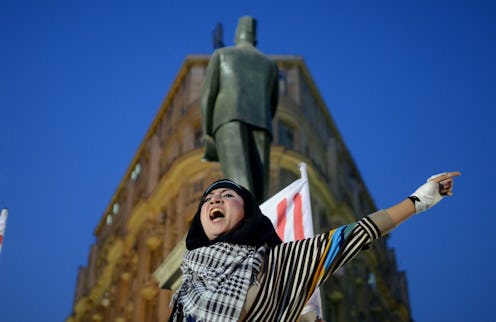When protesters forced longstanding president Hosni Mubarak out of office in 2011, it became clear that Egypt's people wanted to make room for a more accountable and just government. But while the Arab Spring signaled some progressivism and change, discrimination against Egyptian women remains a norm in the volatile political environment dictated by an outdated Sharia law. In America, women know firsthand how difficult it is to reverse the sexism ingrained in every institution. But in Egypt, and other neighboring nations, laws themselves are fundamentally sexist in some of the worst ways.
Last November, the World Economic Forum's Global Gender Gap Report ranked Egypt the 10th worst country for gender equality. Economic and educational gender gaps, paired with family laws, make it difficult for women to survive independently from a man. She cannot leave him without a court order that's very difficult to attain. Women make up just 26 percent of the workforce, and with an average income of $5,213, they earn more than three times less than men do. Furthermore, only 65 percent of women are literate, which hinders a woman's own agency.
With such injustices comes the failure to address sexual violence in many cases. In a report titled "Circles Of Hell: Domestic, Public And State Violence Against Women In Egypt," Amnesty International found that nearly 99 percent of women have experienced some form of sexual harassment. Over half of the women surveyed by the Ministry of Health reported domestic violence as well.
In many ways, men in Egyptian society are invincible from legal punishments for possessing a woman's entire life — whether it's refusing divorce, prohibiting her from leaving the house without permission, or using violence against her. Family law, which heavily incorporates Sharia law, is undoubtedly the most discriminatory policy in the nation. According to the court's adultery laws, a man can kill a woman for the small price of 24 hours in jail if he finds her cheating. If he cheats on his wife outside of the marital home, however, he has committed no wrong in the eyes of the law. Instead, the woman whom he was with may be charged for prostitution. Additionally, a man can bar his wife divorcing him, but he can leave without fault.
Clearly, Egypt has a long way to go when it comes to implementing the most basic women's rights, but it is making some small strides. In September 2014, Egypt's parliament acknowledged the prevalence of sexual violence toward women by creating an Interior Ministry unit that installed street cameras to better monitor and prevent sexual attacks. But in the meantime, what can you do to help lend greater agency to Egyptian women?
1. USAID's Gender Equality And Women's Empowerment Sector In Egypt
USAID in Egypt addresses gender inequality by improving education, political involvement, and maternal care, among other initiatives. The government agency provides work and internship opportunities for young Egyptian girls living in rural areas to address economic inequality as well as educational gender gaps.
2. Women On Walls
Women On Walls, a graffiti initiative that began in 2013, encourages women to express their feelings on women's rights and the struggles Egyptian women face. According to the initiative's website, the end goal is female empowerment through creativity, and the illegal art form delivers a voice of resistance. WOW isn't a charity, but you can support these women by sharing their art and their message out on social media. If more people are aware of the problem, more action will be taken.
3. Coptic Orphans' Valuable Girl Project
Coptic Orphans' Valuable Girl Project trains young women so that they may become educational mentors for younger at-risk girls living in poverty. The organization seeks to give these girls an alternative option to marrying early by encouraging education.
4. The Egyptian Center For Women's Rights
The Egyptian Center For Women's Rights asks for you to simply subscribe to a newsletter and spread the word. The NGO is amazingly creative in its furthering of women's rights. Members address legislative policies, participate in international agreements, and head programs that help women take control of their lives. In particular, the organization has written a manual on how to stop sex trafficking and has trained dozens of women to become politicians. Check out some of their awesome programs and initiates and share them with friends to raise awareness.
